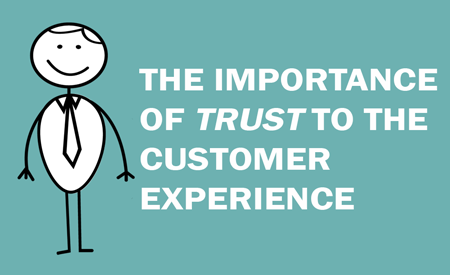The importance of trust to the customer experience

When asked why they choose to do business with a particular organization, consumers give a variety of reasons, from price and ease of the buying process, to simply having the product that they want in stock. However, one factor that is common to all purchasing decisions is trust. Trust that the company will live up to its promises, provide the product or service it specified and not let the customer down.
In fact, last year a survey by CNBC highlighted some of the key ways that brands can lose consumer trust. 75% of consumers pointed to a poor experience with the product, 71% to a underwhelming customer service experience and 67% to a product or service that doesn’t live up to the company’s promise.
The annual Harris Reputation Quotient study which asks 23,000 consumers to rate the reputations of 100 top companies, identified the following factors that had the greatest impact on reputation:
- Lying or misrepresenting the facts about a product of service (rated as very/extremely damaging by 80% of respondents)
- Intentional wrongdoing or illegal actions (again, 80%)
- Security or data breaches that expose personal information (74%)
- Product recall/food contamination (66%)
All of these erode trust and consequently drive customers away. Trust, like anything to do with reputation is hard-won and the results can be catastrophic when lost. In the 2018 Harris study the organization ranked at the bottom of the list for its reputation is Japanese auto parts supplier, Takata Corp, whose air bags were found to explode with too much force and have been linked to deaths and injuries. This prompted the largest recall in automotive history and has forced Takata and its U.S. unit, TK Holdings Inc, into bankruptcy.
So how can companies ensure that they are trusted, particularly at a time when consumers are much more demanding and expect the highest standards? I’d pick out four areas that may sound simple, but are the absolute bedrock of building and retaining trust:
1. Deliver on your promises
The primary issue that destroys consumer trust is when a company breaks its promise to them. This could be not delivering an item by the specified date, not showing up to install something, or failing to follow through on a verbal promise to refund money. Some factors may appear small – for example if a company website is down or it fails to respond to an email within the time frame the business itself specified. However, if an organization can’t get the little things right, it undermines the consumer’s faith that they’ll be able to deliver more complex interactions. So businesses need to be honest with customers and not promise things that they cannot be sure of providing. Systems need to be joined-up and always-on, so that consumers are reassured by a fast, accurate response to queries, for example.
2. Communicate
Business today is complex and things can go wrong at even the most trusted firms. What consumers want is to know what is happening, and get a consistent message from the company, however they choose to make contact. If a delivery has been delayed by factors outside your control, let customers know in good time, on the channel of their choice. They may be upset or annoyed, but apologizing and empathizing will help preserve long-term trust. Failing to keep them informed, or giving wildly different information on different channels is guaranteed to erode trust and damage your reputation. Therefore ensure you have the ability for agents to access consistent information, whatever the channel, to keep consumers up to date and be proactive in reaching out if circumstances change. No-one wants to wait in for a cable installer unnecessarily.
On a corporate level, don’t be afraid to apologize if crises occur. This needs to come from the top, and be backed up by real action to ensure the problem is solved as quickly as possible and that safeguards are put in place to ensure it doesn’t happen again.
3. Learn from the best
Companies near the top of the Harris reputation poll, such as Amazon and Disney, go the extra mile when it comes to the customer experience. Amazon invests heavily in making the whole process simple and straightforward, encouraging trust and repeat business. Disney builds emotional engagement with consumers and ensures that the overall experience is flawless and consistent across movies, TV shows, theme parks and merchandise. All companies should look at how they build and retain trust and see which lessons can be applied to their organization. It doesn’t matter if you’re not a retailer or an entertainment company – consumers will judge you to the same high standards, so make sure you live up to them. Keep innovating and improving the experience to grow trust with your customers.
4. Invest in your staff
Consumers experience a brand in a number of ways, such as through advertising and marketing campaigns, and recommendations/complaints from family, friends and colleagues. However, thelargest number of interactions come with company staff – whether instore, answering queries on digital or analog channels or even delivering parcels/installing services. Poor service and a bad attitude from individual agents or employees undermines reputation and is often the root cause of a customer leaving. Therefore empower your staff with the right training, access to systems andprovide them with the information they need to do their jobs. That way they’ll become ambassadors for your brand, not its Achilles’ Heel.
At a time of increased competition and almost limitless choice, trust is a vital part of attracting and retaining customers. Companies therefore need to make sure that they have put in place the people, systems and processes to safeguard trust and continually focus on delivering on their promises.







Comments